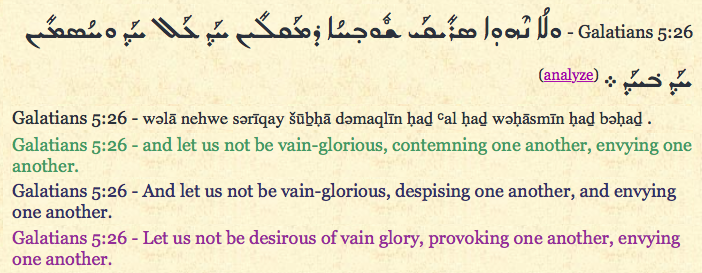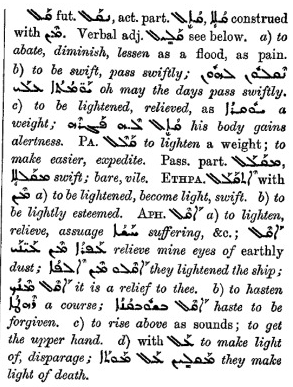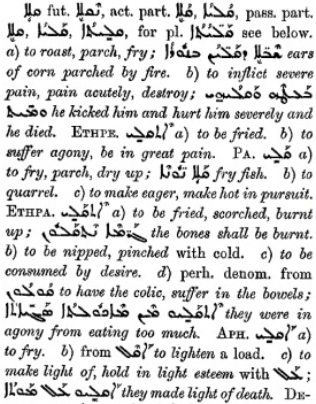This is the last of ten posts looking in turn at the first ten occasions, starting in ‘Letters from Heaven’ at Galatians its first book, when Brian Simmons claims that what he writes is ‘translated from the Aramaic’. Here I look at Galatians 5.26. For more on my purpose and methodology see here and here.
Galatians 5.26
μὴ γινώμεθα κενόδοξοι, ἀλλήλους προκαλούμενοι, ἀλλήλοις φθονοῦντες. [NA 28]
which almost demands to be translated as the ASV does, very simply:
Let us not become vainglorious, provoking one another, envying one another. [ASV]
and Tyndale likewise, long ago:
Let vs not be vayne glorious provokinge one another and envyinge one another. [Tyndale]
κενόδοξος comes from κενός, meaning ’empty’, and δόξα, meaning ‘honour’ or ‘glory’. BDAG’s definition is ‘pertaining to having exaggerated self-conceptions’, which ‘vainglorious’ captures best I think. But renderings with ‘conceited’ or ‘boastful’ and similar are of course quite acceptable too.
προκαλέω means ‘to call out to someone to come forward’, and thus frequently in a hostile sense ‘provoke’, ‘challenge’ [BDAG].
Simmons:
‘So may we never be found dishonoring one another, or comparing ourselves to each other, for each of us is an original. We have forsaken all jealousy that diminishes the value of others.’ [Simmons]
Simmons seems simply to have substituted two ideas of his own, that is to dishonour others and to compare ourselves with others, for two ideas contained in holy scripture, that is to become vainglorious oneself, and to provoke others.
Simmons removes the exhortation against envy and substitutes for it an assertion that a certain type of jealousy has been left behind. On the face of it, envy is liable to arise when we are tempted to perceive another as greater than ourself, or at least that their situation is better in some way than ours. If by jealousy Simmons means envy, I don’t quite see why this should in itself involve ‘diminishing the value of others’, although it may certainly give rise to ‘putting the other person down’ in one’s mind, so as to attempt to rid oneself of the distress.
Needless to say, I see no advantage, and great peril, in substituting one’s own thoughts for God’s thoughts, so we must now turn to the Aramaic to ascertain whether this is indeed the source of Simmons’ rendering of the verse, as he claims it to be.
Here is the Western UBS Peshitta text from dukrhana.com with transliteration and three English translations by Etheridge (green), Murdock (navy), and Lamsa (purple):
It can be seen immediately that all three English translations of the Peshitta are very similar to normal English translations of the original Greek text. The only substantive difference is that Etheridge and Murdock have ‘despising’ or ‘contemning’ (which means the same thing), instead of provoking. The reason seems to be that there is some uncertainty over the meaning of the Syriac word, as may be ascertained by an inspection of the lexicons. It occurs here in the aph’el form. The Peshitta tool gives the lexeme as ܩܠ, qof-lamadh. Jennings gives the basic meaning as to be light or lightened (that is, in weight), but then, without explanation, adds the meaning ‘provoking’ for Galatians 5.26:
The CAL, on the other hand, gives the basic meaning in the C form (causative, corresponding more or less to aph’el) form as ‘to roast’, with the further meaning ‘to vex’, ‘torment emotionally’, under which Galatians 5.26 is listed with the rendering ‘provoke’:
The link to Payne Smith takes one again to meanings connected to lightening (of weight) and lessening. Under the aph’el form, and when the word occurs with ܥܰܠ, (which it does in Galatians 5.26:
)
ܩܠ can mean ‘to make light of, disparage’ (three lines from bottom):
On the next page (506), Payne Smith has the lexeme ܩܠܐ (qof-lamadh-alaf rather than qof-lamadh) with primary meaning ‘roast’. Under the aph’el form, the first meaning is ‘to fry’, but the second is ‘to lighten’ (a load), followed by ‘to make light of, hold in light esteem’ when the word occurs with ܥܰܠ:
Payne Smith’s father R. Payne Smith had cited Galatians 5.26 in his Thesaurus Syriacus (p. 3615) under the Latin meanings ‘sprevit’ (from ‘sperno’, ‘to despise’, ‘contemn’ etc) and ‘contempsit’ (from ‘contemno’, ‘to consider a person … of small value’, ‘to contemn’ etc):
He points out (‘sed’ means ‘but’) that there seems to be a problem reconciling such a meaning with the Greek original ἀλλήλους προκαλούμενοι, but presumably could not find a basis for proposing a meaning like ‘provoke’. If Etheridge and Murdock found no other meanings in the lexicons they were using in the middle of the nineteenth century, then they would have been obliged to translate in the way they did, rightly or wrongly.
Maybe something of this idea of despising can be discerned at the end of Simmons’ rendering of the verse with his peculiar ‘that diminishes the value of others’, but it cannot truly be said that he has translated from the Aramaic. The Peshitta has the exhortation against vain glory, where Simmons has his against dishonouring others, and it has the exhortation against envying others, which Simmons has replaced with an assertion of freedom from that particular vice.
Andrew








One Comment